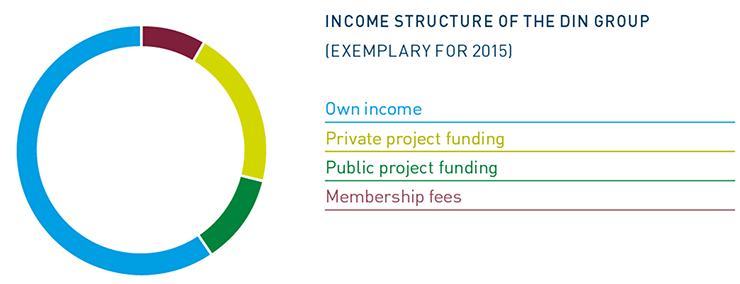金桔
金币
威望
贡献
回帖0
精华
在线时间 小时
|
我们可以看看ISO的邻居DIN(德国工业标准)对“为什么标准要收费”的回答:
(翻译自DIN官网
Financing页面,括号里加了一些自己的理解。)
每一个在工作日常使用(工业)标准的人,都能从中获取许多经济效益:
- 更容易进入国内和国际市场(因为大家都依照一个标准);
- 简化采购程序;
- 提高效率;
- 了解最新的创新成果;
- 更容易拿到质量保证的凭证;
- 降低产品责任风险(出事了拉标准出版方垫背);
- 提高产品安全性;
- 法律确定性;
(工业)标准综合了所有市场合作伙伴的知识,是在由DIN主导的的规范公平的过程中收集总结出来的。
通过对标准的收费,标准制定的工作能保持经济独立自主。事实上,DIN(德国工业标准)的60%(德语版网页写的是75% =.=)的工作是通过标准的收费来支撑的。这些工作(工作的具体内容胡杨树的答案已经列得很清楚了)不仅包括制定标准本身,还包括确保整个标准收集的一致性,使国家标准与欧洲和国际标准协调一致,并不断更新标准,以确保它们反映当前科学技术发展的状态。
制定标准的成本是分摊在那些从标准中获益的人。这样的话,工业标准制定之初,就是始于市场需求的——多么一个合理的过程。(这应该是最重要的原因,工业标准本身就是市场的产物,本身就是商品,问它为什么要花钱的时候就要问问自己,为什么习惯性地take for granted了。)
------------------------------切------------------------------
附一个DIN的收入来源图:

© DIN (Source:
Financing)
DIN是一个非盈利性组织,其主要(70%以上)资金来自标准的出售,其他技术资料出版物和服务的收费。此外的收入来源有:(企业提供的)项目资金,与项目有关的公共基金和会员费。
在德国,标准化是工业自我形成的一种形式。通过用户对标准的购买,标准制定能持续保持经济独立和工作高效。
------------------------------切------------------------------
评论区里有人问,为什么法律法规就不用收费?
事实上对DIN的引用就要收费的(ISO我并不知道),而引用法律法规就不用给国家交钱。这个问题DIN官网也给出了回答,略作翻译如下:
太累。。下次翻完。。
Laws and regulations are drawn up by governmental bodies and are financed by the tax-payers. 由纳税人承担费用(并不是免费的啊,你也交了钱啊!你知道吗?)。However, DIN's work is privately organized and financed.DIN的工作是私营组织承担费用的(没有纳税人给钱,只能靠工业界人士添砖加瓦了!) Even where governmental bodies have an interest in standards work and provide political, staffing and even financial support for this work, the results of this work remain in the hands of a private body and are thus protected by copyright; this means that technical rules are generally not free of charge.
When a standard is referred to in legislation it nevertheless does not become a legal document and is thus not provided free of charge. This is expressly stated in Article 5 (3) of the German Copyright Act: The explanatory memorandum of 2002 relating to the Act states that setters of technical rules rely on the sales of their documents to finance their non-profit work. Thus, ensuring the financing of standards work has a higher priority than the wish to have free access to technical rules referenced in legislation.
总结一下就是,辛辛苦苦制作出来的标准、条文,花了多少的人力物力,都是成本,都需要收回的,政府不会干亏钱的事,吸血的工业界又怎么可能免费做公益。引用法律法规不是不给钱,而是靠纳税人支撑的(赶快算算自己交了多少!),工业标准更是要收费了。
再引申出一个问题,国家为什么不资助标准的制定?
DIN(Deutsche Industrie Norm)是德国管理标准化的机构,它并非国家管理的机构——虽然经常被这么认为——而是一家私营,非盈利注册协会,支持其工作的资金主要来自标准的出售。由标准的使用者来决定哪些标准符合市场需求,确保了标准的制定和发展始终是实际实用的。
------------------------------切------------------------------
附英文原文如下:
Everyone who uses standards enjoys a number of economic advantages:
- Improved market access - at national, European and international level
- Simplified procurement procedures
- Increased efficiency
- Staying up-to-date with the latest innovations
- Easier documentation for quality assurance
- Reduced product liability risk
- Improved product safety
- Legal certainty
Standards contain the combined knowledge of all market partners which is gathered during a fair process moderated by DIN.
By purchasing standards, standards users ensure the private financing of standards work. In fact, sixty percent of DIN's work is financed through the sales of standards. This work not only entails the development of the standards themselves, it also includes ensuring the consistency of the standards collection as a whole, harmonizing national standards with European and international standards, and continually updating standards to ensure that they reflect the current state of technology.
The cost of developing standards is thus distributed among those who gain the most benefits from them. In this way industry itself determines which standards are in line with the market - a fair approach.
------------------------------切------------------------------
DIN还回答了
- 谁给标准定价?
- 为什么一份几张纸标准这么贵,比我买一本几百页的专业书还贵(德国一本专业教材动辄二百欧)?
- 怎么便宜搞到的标准?
- 我能复印、传播我公司提供的标准吗?
有人关注此回答的话我再往下翻译吧。
什么!你都看到这儿了!那么DIN还提供了一个详细的介绍自己Financing的PDF,
http://www.din.de/blob/70622/b9b6d489bce298e5c66bfed01de5cfb2/financing-en-data.pdf 。 |
|
 /4
/4 